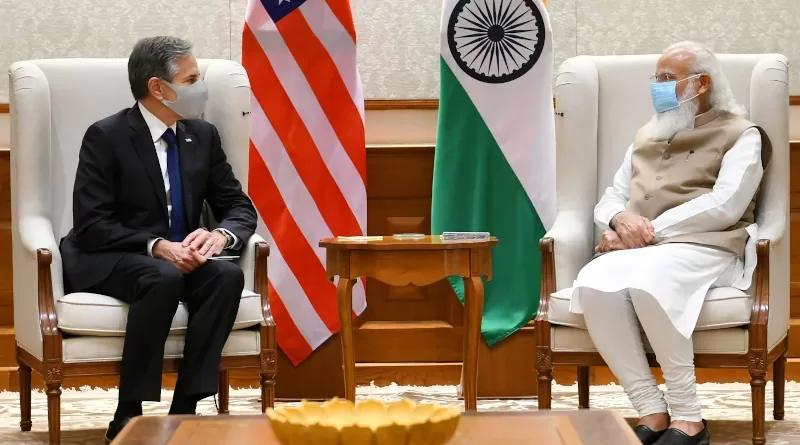Blinken’s Visit And The US Factor In Indian Foreign Policy – Analysis
By Observer Research Foundation
By Harsh V. Pant
India’s ties with the US have always stood out for the sheer hyperbole they tend to generate in public discourse. For years, even as China continued to change the strategic environment around India to New Delhi’s disadvantage, our favorite pastime was to talk about the various versions of non-alignment. We pretended that if we remained equidistant between Beijing and Washington, we would be able to keep China in good humor. In summit after summit with our Chinese ‘friends’ we railed against American imperialism and unipolarity. Even after China had made a mockery of our trust as far back as 1962, the Indian strategic community’s favorite refrain remained: Can the US be trusted?
Despite the Trump Administration being largely good for India, many in India disliked Donald Trump for his ideological proclivities. And when the Biden Administration arrived on the scene, many had hoped that it would downgrade ties with India because of its focus on human rights.
In an ironical twist, those who had long demanded that America not involve itself in India’s domestic matters wanted Joe Biden to take the Modi government to task. Much to their dismay, we have seen India-US relations achieving even greater heights in a relatively short period of time.
The Biden Administration has continued with its predecessors’ tough approach towards China and in fact, has ratcheted it up in certain domains. With months of entering the White House, Biden called the virtual summit of the Quad leaders, thereby galvanizing a platform that had been looking for a sense of direction. The US Secretary of Defense Lloyd Austin visited India as part of his first overseas tour followed by the visit of the Indian External Affairs Minister, S Jaishankar to the US. And this week India hosted the US Secretary of State, Anthony Blinken, who hailed the India-US relationship as one of the “most consequential” in the world.
This relationship has become consequential not only because of the most significant challenge both nations face with the rise of a power like China but also because of the strategic choices the two nations are willing to make to manage this rise and its attendant consequences. Where New Delhi was lackadaisical in its outreach to the US and Washington had little time for India in the past, today the enormity of their common challenge has opened up new opportunities for strategic collaboration.
Earlier this week in a first for a member of the Biden Administration, the US Secretary of Defense mentioned Chinese aggression against India in the same breath as its maritime exploits in Southeast Asia, underlining a new realisation in Washington that India needs a closer integration along with its traditional partners.
The Quadrilateral Security Dialogue—the Quad—has benefited from this convergence, giving a new lease of life to an idea that had dies a premature death in 2007. Today, the new found commitment to expand the Quad partnership, with Australia and Japan, is reflective of a new mindset in Washington and New Delhi that is seeking an expansive engagement on areas as wide-ranging as infrastructure development, vaccine development and distribution, maritime security, and climate change. Blinken’s visit saw a particular focus on expanding vaccine production to make it globally affordable and accessible even as the US announced an additional $25 million funding for India’s vaccine programme.
From India’s perspective, it was Afghanistan that was on the top of the agenda given its immediate ramifications in the context of an accelerated departure of American forces from the war-torn nation. The Taliban has been making rapid gains in recent months with its traditional brutality write large. New Delhi’s concerns revolve around the possibility of Afghanistan once again becoming a safe haven for extremists after the full military takeover by the Taliban. There have been apprehensions that the US has failed to take New Delhi’s views into account as it plans a post-withdrawal strategy with another Quad that includes Pakistan, Afghanistan and Uzbekistan.
During his visit, Blinken and Jaishankar emphasised their common outlook on the need for a political resolution in Afghanistan and the US offering an assurance that it would remain “very much engaged in Afghanistan.” That the US remains keen on Indian involvement was underscored by Blinken’s comment that “as a credible partner in the region, India has and will continue to make vital contribution to Afghanistan’s stability and development.”
The issue of democracy and human rights also appeared but not in the way many had hoped. Blinken commended India’s democracy as the “largest expression of free political will” anywhere in the world and acknowledged the challenges that all democracies face by suggesting that the US recognizes “that every democracy, starting with our own, is a work in progress.” Washington is right to view “Indian democracy as a force for good in defense of a free and open Indo-Pacific” and New Delhi is right in insisting it is justifiably proud of its democratic traditions and no longer reticent about engaging the US on the subject.
If India could build ties with the US when New Delhi was politically dysfunctional and economically weak, there is no reason why it should be constrained in giving this relationship a new momentum when it more self-confident than ever and there is broader structural convergence. As Blinken himself articulated cogently, “There is greater imperative than ever on cooperation, coordination, collaboration among countries, especially among countries who share basic perspectives, basic values, and basic interests. And that is certainly the case with the United States and India.”
Blinken’s visit has once again underscored that when it comes to India-US relations today, every challenge is an opportunity. And, more importantly, New Delhi and Washington seem determined to make the most of these opportunities.
This article originally appeared in CNBCTV18.

